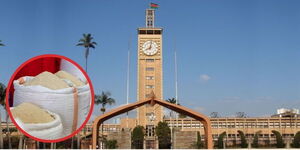The National Land Commission (NLC) has reserved 1,974 hectares of land for the National Intelligence Service (NIS) in Tana River County.
In a gazette notice dated October 26, NLC Chairperson Gershom Otachi announced that the commission will transfer control of the Masalani Block 1/2 to NIS for the development of security infrastructure.
"IN EXERCISE of the powers conferred by sections 15, 16, 17, and 18 of the Land Act and Section 105 (2) of the Land Registration Act, 2012, the National Land Commission hereby issues this reservation order to reserve and vest the care, control, and management of the land parcel no. Masalani Block 1/2, measuring approximately 1974.0 hectares and situated in Tana River," the notice read.
"The management body shall not part with possession of the reserved land or any portion thereof without the written consent of the National Land Commission," it added.
On the other hand, the commission has reserved 1.941 hectares situated in Mbita, Homa Bay County, for the Kenya Ports Authority (KPA). KPA will use the land to establish a park area and ancillary services.
Additionally, the commission is set to reserve a total of 1,014.15 hectares of land for the Kilifi county government for different purposes.
According to the commission, three parcels of land measuring 108.8 hectares, 635.3 hectares, and 21.55 hectares will be used for settlement purposes, and 248.5 hectares will be used for a salt farm.
During the first 180 days of the reservation order, the institutions shall be required to prepare a land use and management plan that complies with physical planning regulations, addresses environmental considerations, upholds constitutional values, provides regulated access to communities, and secures wildlife corridors.
Additionally, management bodies of the institutions have been directed to identify and map ecologically affected areas, safeguard, and record resources such as water bodies.
According to Otachi, once in control, the institutions will make sure that at least 10 per cent of the land is covered by trees and vegetation, in line with the government's agenda to increase tree cover.
The institutions shall also be required to leverage climate-smart technologies and ensure they comply with circular economy practices such as waste reduction, recycling, and composting.
"Before undertaking any major development project, the management body shall conduct an Environmental and Social Impact Assessment (ESIA) in line with the Environmental Management and Coordination Act, 1999 (EMCA)," the notice read.
The institutions shall also remit statutory payments to the county governments as required by the law.












